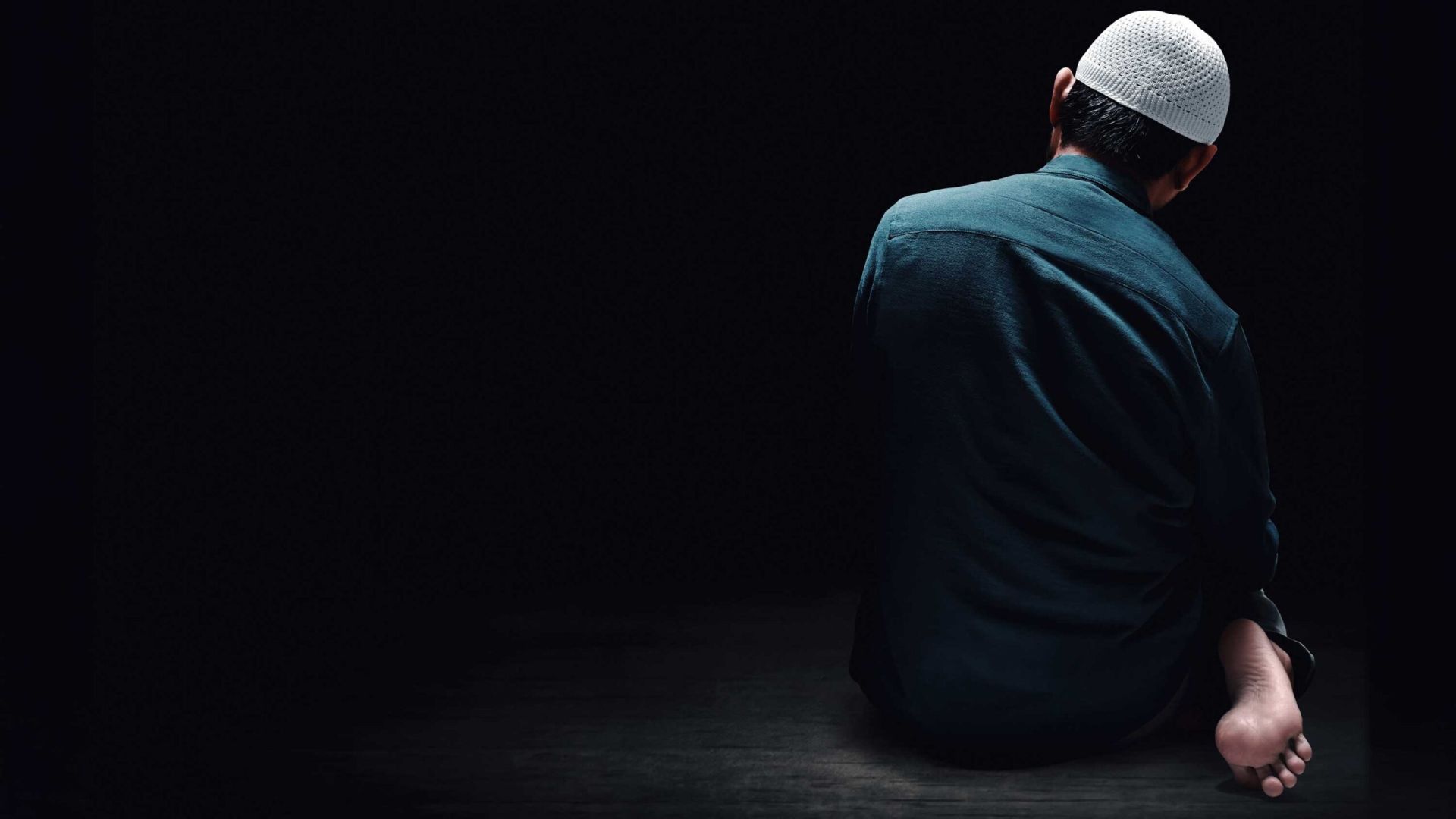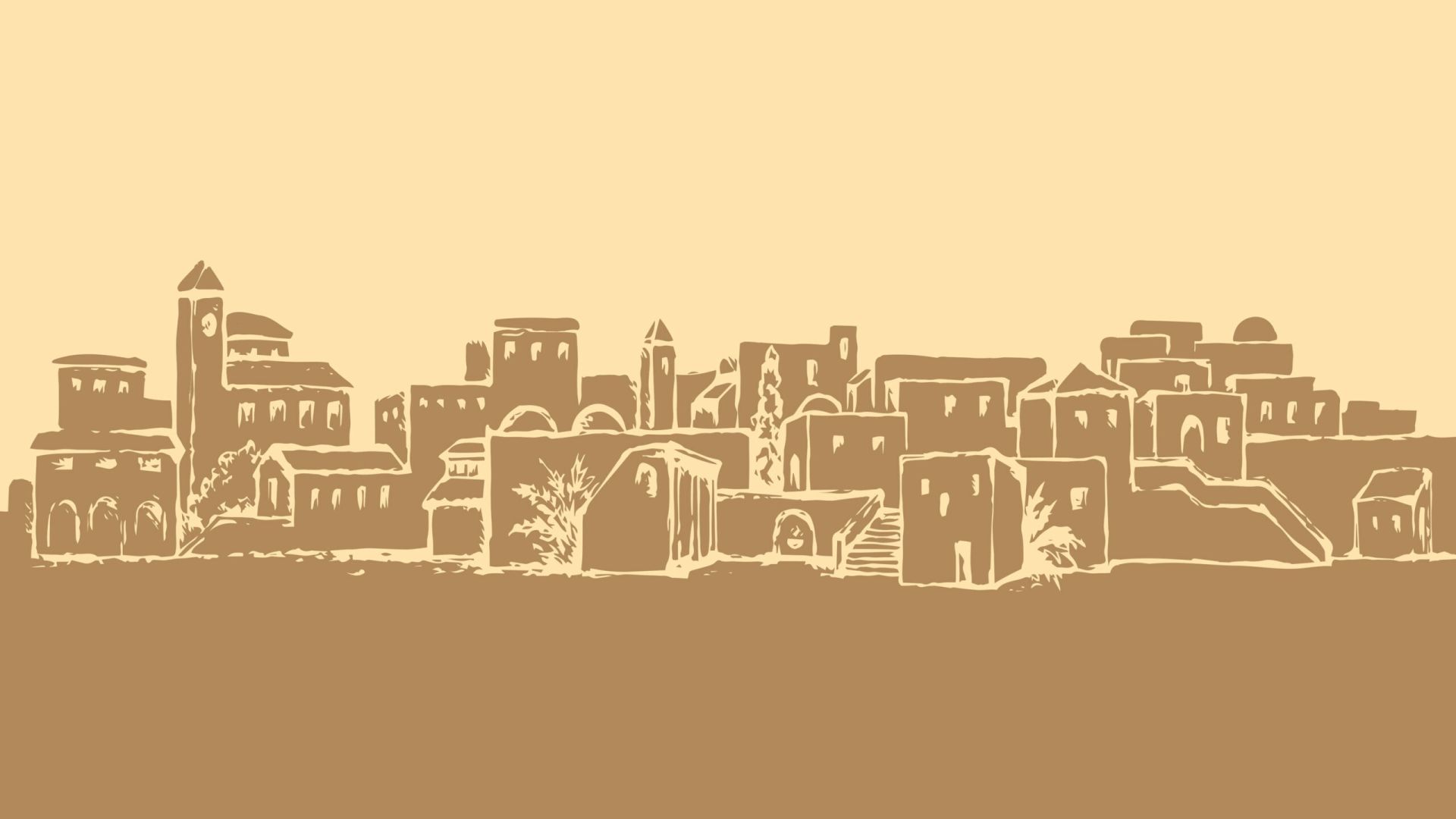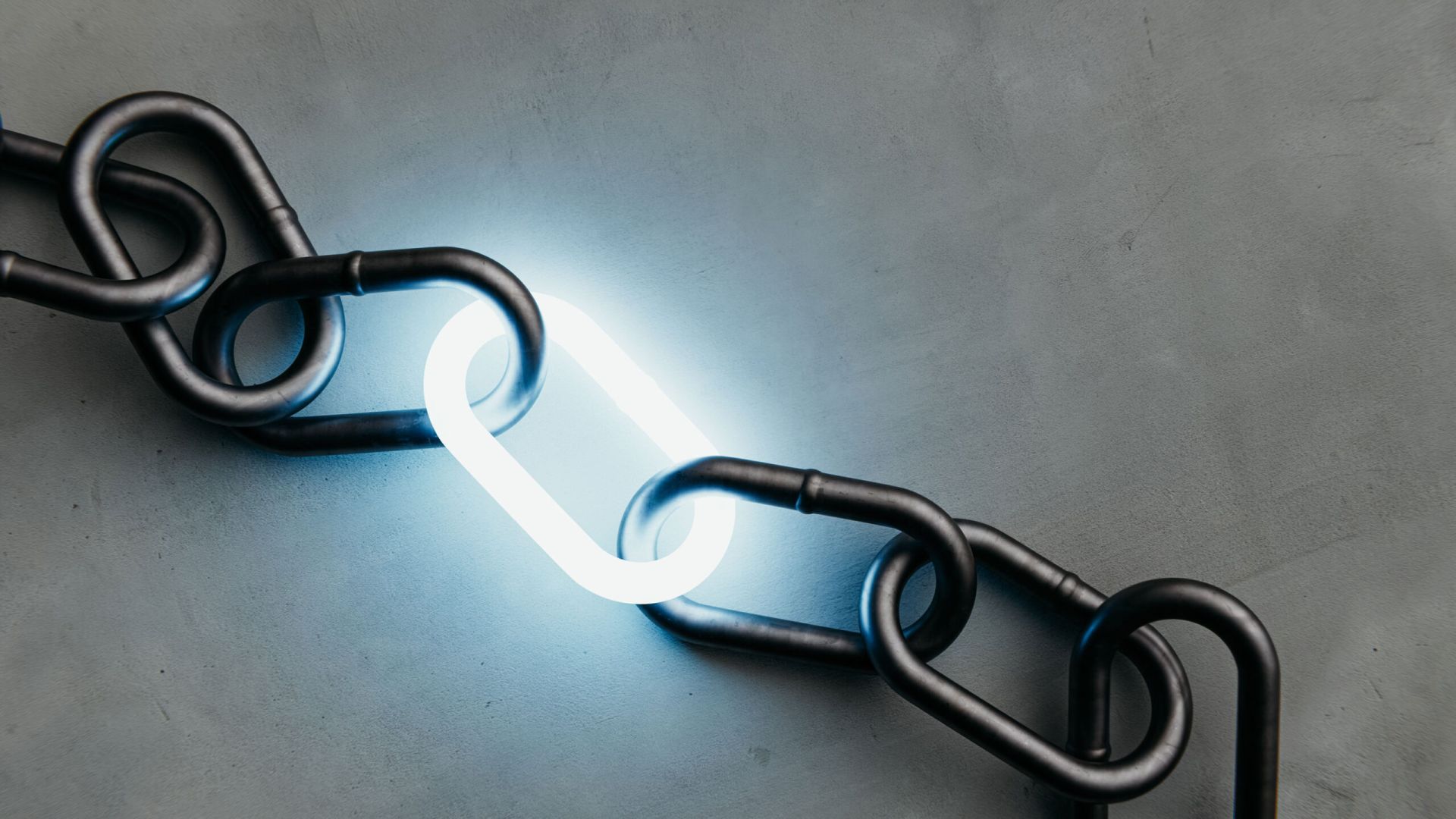Disliked Habits to Be Avoided When Performing Ṣalāh
Imām Muḥammad ibn Ṣāliḥ al-ʿUthaymīn
Disliked Habits to Be Avoided When Performing Ṣalāh
Imām Muḥammad ibn Ṣāliḥ al-ʿUthaymīn


Disliked Manner of Sitting: Al-Iqʿāʾ
Among the disliked (makrūh) manners of sitting when in ṣalāh is al-iqʿāʾ. The Prophet (صلى الله عليه وسلم) forbade the praying person from sitting in this way, likening it to that of a dog.1 Additionally, it is an inherently unstable manner of sitting that necessitates unwarranted exertion. Al-Iqʿāʾ has several manifestations:
- To spread the tops of both feet on the ground, sitting on the heels. This is disliked for the following:
- It resembles the natural sitting of a dog.
- It is inherently tiring due to instability and the constant need to re-balance oneself.
- To place both feet upright, with the balls of the feet on the ground, again sitting only on the heels. This is the most apparent and identifiable form of al-iqʿāʾ as authentically confirmed in Ṣaḥīḥ Muslim on the authority of ʿAbdullāh ibn ʿAbbās (رضي الله عنهما). Although some scholars have adopted the opinion that this manner of sitting is actually from the Sunnah, as Ibn ʿAbbās (رضي الله عنهما) said: “It is from the Sunnah of your Prophet”.2 Despite this, most scholars have opposed this view, rejecting that such a manner of sitting could be from the Sunnah. It would appear—and Allāh knows best—that the opinion espoused by Ibn ʿAbbās (رضي الله عنه) in this matter is referring to an antiquated practice that has been abrogated by the great multitude of copious aḥādīth in which the Prophet (صلى الله عليه وسلم) used to spread the apparent top of his left foot on the ground and raise his right one by placing the balls of his foot on the ground (iftirāsh).
- The closest form of sitting in its resemblance to a dog: to raise both the thighs and ankles, sitting on one’s buttocks, while stabilising oneself by placing his hands on the ground (similar to a deep squatted position). This form of sitting is also the most reminiscent of the word iqʿāʾ from a purely linguistic standpoint.
- To raise both feet by placing just the balls of the feet on the ground and sitting on the ground between them.
Other Manners of Sitting
There are also additional forms of sitting besides al-iqʿāʾ that—while not makrūh—are contrary to the Sunnah.
Cross-Legged
For example, sitting cross-legged is not makrūh but also not legislated in general, except that it may be done by a person who prays seated (without a chair) in place of his standing and when performing rukūʿ. Otherwise, the one who prays seated must assume the iftirāsh position when in jalsah, save for the final rakʿah wherein he may incorporate tawarruk (placing the left side of one’s thigh on the ground, raising the right foot by placing the balls of the foot on the ground, sitting with the buttocks on the ground).
Sajdah: Allowing One’s Upper Arm to Contact the Ground
It is also disliked (makrūh) to spread forth one’s upper arm in contact with the ground when performing sujūd. As the Prophet (صلى الله عليه وسلم) said: “Seek balance when performing sujūd, and avoid spreading your arms on the ground in the manner of a dog”.3 This is because it is most inappropriate for a person to resemble the mannerisms and natural inclinations of animals in any way. In this vein, animalistic resemblance is mentioned by Allāh only in the context of shameful censure and reproach. As the Most High said:
مَثَلُ الَّذِينَ حُمِّلُوا التَّوْرَاةَ ثُمَّ لَمْ يَحْمِلُوهَا كَمَثَلِ الْحِمَارِ يَحْمِلُ أَسْفَارًا ۚ بِئْسَ مَثَلُ الْقَوْمِ الَّذِينَ كَذَّبُوا بِآيَاتِ اللَّهِ
“The likeness of those who were entrusted with the (obligation of the) Tawrāh (Torah) (i.e. to obey its commandments and to practise its legal laws), but who subsequently failed in those (obligations), is as the likeness of a donkey who carries huge burdens of books (but understands nothing from them). How bad is the example (or the likeness) of people who deny the āyāt (proofs, evidences, verses, signs, revelations, etc.) of Allāh.”
(Al-Jumuʿah, 62:5)
Also, as the Prophet (صلى الله عليه وسلم) said concerning those who speak whilst the imām is delivering the khuṭbah: “Their likeness is that of a donkey who carries huge burdens of books”.4 And the Most High also said:
وَاتْلُ عَلَيْهِمْ نَبَأَ الَّذِي آتَيْنَاهُ آيَاتِنَا فَانسَلَخَ مِنْهَا فَأَتْبَعَهُ الشَّيْطَانُ فَكَانَ مِنَ الْغَاوِينَ ﴿١٧٥﴾ وَلَوْ شِئْنَا لَرَفَعْنَاهُ بِهَا وَلَٰكِنَّهُ أَخْلَدَ إِلَى الْأَرْضِ وَاتَّبَعَ هَوَاهُ ۚ فَمَثَلُهُ كَمَثَلِ الْكَلْبِ إِن تَحْمِلْ عَلَيْهِ يَلْهَثْ أَوْ تَتْرُكْهُ يَلْهَث
“And recite (O Muḥammad (صلى الله عليه وسلم)) to them the story of him to whom We gave Our āyāt (proofs, evidences, verses, lessons, signs, revelations, etc.), but he threw them away, so Shayṭān (Satan) followed him up, and he became of those who went astray. And had We willed, We would surely have elevated him therewith but he clung to the earth and followed his own vain desire. So his description is the description of a dog: if you drive him away, he lolls his tongue out, or if you leave him alone, he (still) lolls his tongue out.”
(Al-Aʿrāf, 7:176)
And the Prophet (صلى الله عليه وسلم) said: “The one who seeks the remittance of that which he had given as a gift may be likened to a dog that returns to indulge in his own vomit. Such an evil description shall not be ascribed to us”.5 In this way, a human being is not likened to an animal except in the context of blame and disdain. In consideration of this, we say: If resemblance to animals is so blameworthy outside of ṣalāh, then what degree of blame should be ascribed to the one who seeks animalistic resemblance when performing the ṣalāh itself?
Therefore, when in sajdah, a person should stretch forth his elbows from his sides, raising them above the ground. The exception to this—as mentioned by the jurists (رحمهم الله)—is if a person remains in sujūd for a prolonged period such that his arms tire. In such an instance, it is permissible for him to seek respite by supporting his elbows on his knees [while still not resting them on the ground]. This is a manifestation of the easing of the burden of performing sajdah, an ease that is most desirable and sought after in Islamic legislation. In this way, jalsat al-istirāḥah has been legislated for those unable to stand up immediately from sujūd to the standing position.6
Unnecessary and Excessive Movement
It is also disliked for one to move unnecessarily when praying. For fidgeting and excessive, unwarranted movement is detrimental in several ways:
- Distracting the heart: Excessive physical, bodily movement stems from an unconcentrated, perpetually moving heart. For the body does not fidget and move in this way except when the heart is likewise moving to and fro, the occurrence of one stipulating the occurrence of the other. This constant movement will undoubtedly behave as a distraction from the ṣalāh being performed. As the Prophet (صلى الله عليه وسلم) said, upon seeing a curtain that had been hung within ʿĀʾishah’s (رضي الله عنها) domicile: “Take this cloth to Abū Jahm [companion who used to gift such cloth to the Prophet (صلى الله عليه وسلم)] and bring me the Anbijāniyyah (plain, thick cloth devoid of imagery or depictions) of Abū Jahm, for it has recently distracted me from the performance of my ṣalāh”.7 We may interpret this ḥadīth as an encouragement towards the complete avoidance of anything that distracts one from their performance of ṣalāh.
- Antithetical to the purpose of ṣalāh: Excessive fidgeting and unnecessary movement represents a form of playful mockery which is contrary to the serious, important nature of the ṣalāh being performed.
- Extra movements are external to ṣalāh: As the ṣalāh itself comprises specific movements like standing, sitting, bowing, and prostrating, all of which are not inclusive of these extra unnecessary movements.
As for the ḥadīth mentioned by some scholars in this matter in which the Prophet (صلى الله عليه وسلم) once saw a man excessively moving in ṣalāh and said: “If this man’s heart had attained humility, then his limbs would also follow in humility”,8 this ḥadīth is weak and should not be utilised as evidence in this issue. Also, the detrimental aspects of excessive movements in ṣalāh as mentioned here forego the need to rely on such narrations anyways.
Al-Takhaṣṣur: Placing One’s Hands on One’s Hips
It is also disliked for the praying person to place his hands on his hips during ṣalāh as the Prophet (صلى الله عليه وسلم) forbade men from praying in this manner,9 justifying the prohibition as being among the practices of the Jews as narrated in the ḥadīth of ʿĀʾishah (رضي الله عنها).10 That is, the Jews used to place their hands on their hips when praying. Additionally, this manner of standing is often associated with a person being in a state of unassuredness or indecision, as if pondering over something.
Holding an Item to Fan Oneself
It is also disliked for anyone to fan himself whilst praying, by utilising a palm frond or any other implement, moving it back and forth to generate cool air. This is disliked because it represents a form of playful mockery and unnecessary movement, while also distracting from the ṣalāh being performed. However, if there is a clear and dire need for such fanning—for example, a person is afflicted with a high fever or praying in intense, sweltering heat—and he fans himself to marginally alleviate some of the heat’s intensity whilst he prays, then there is nothing wrong with this. This is consistent with the overarching Islamic judicial principle: All disliked acts are rendered permissible in the face of need.
Continually Favouring the Right or Left Leg When Standing
As for alternatively leaning on one’s right or left foot, such that he supports his weight by favouring one leg and then the other, there is nothing wrong with this either. Especially if the person is standing for a prolonged period in ṣalāh. Although this should not be done excessively nor should his feet ever fall out of alignment with one another as a result of it.
Cracking Finger Joints
It is also disliked for anyone to crack the joints of his fingers in ṣalāh, making noise with them. As this also represents a form of playful mockery while also stipulating the sowing of discord and distraction to those praying around a person when in congregation.
Interlacing Fingers in Ṣalāh
It is similarly disliked for the praying person to interlace his fingers during ṣalāh as evidenced by the ḥadīth that forbids anyone intending to enter the masjid from interlacing his fingers.11 If this is the desired state of the one who only intends to enter the masjid, then avoidance of this practice by the one who is actually praying is even more deserved. It was also narrated that the Prophet (صلى الله عليه وسلم) separated the fingers of a man who had interlaced them.12
It should be noted that, following the conclusion of the ṣalāh itself, none of these acts are considered disliked: not cracking one’s finger joints or interlacing fingers. Furthermore, it was also narrated that the Prophet (صلى الله عليه وسلم) himself interlaced his fingers as in the ḥadīth of Dhī al-Yadayn in which the Prophet (صلى الله عليه وسلم) led his companions in the performance of one of the evening prayers but mistakenly prayed only two rakʿahs after which he (صلى الله عليه وسلم) stood beside a raised wooden plinth erected in the masjid, leaning on it and interlacing his fingers.13 As for the cracking of one’s finger joints, if the noise from this causes distraction for other members of the congregation, then this practice is best avoided when in the masjid even when not praying.
Praying While Having to Answer the Call of Nature
It is also disliked (makrūh) for one to perform ṣalāh while needing to urinate. The evidence of this is that the Prophet (صلى الله عليه وسلم) forbade the performing of ṣalāh upon the arrival of food, and whilst fighting the urge to urinate or defecate.14
The wisdom behind this prohibition is that such abstinence can result in grave physical, bodily harm. Holding one’s urine set for excretion from the body inflicts harmful pressure on both the prostate as well as the tubules through which the urine flows within the body. The resultant buildup of fluid may even result in prostate enlargement causing the tubules that carry the urine to become looser and more flacid, or become overly contracted such that a person is rendered unable to urinate. This has occurred on occasion.
Abstaining from urination or defecation to pray is also detrimental to the ṣalāh itself. This is because the one who is actively fighting the urge to satisfy the call of nature will absolutely be unable to pray with a present heart, nor with any degree of true concentration or humility. For his mind is preoccupied with fighting the urge to urinate, defecate, and even pass wind. It is, therefore, disliked for all these varieties of people to pray until they have satisfied their need.
[Q]: A man has performed wuḍūʾ but is fighting the urge to either pass gas or urinate. However, if he chooses to satisfy these needs, he would not possess the requisite water needed to re-perform wuḍūʾ. Do we direct him to satisfy his urges and perform tayammum to pray, or should he pray while fighting his needs?
[A]: He should satisfy these needs and perform tayammum to pray. The reason for this is that performing tayammum and praying is not makrūh according to the consensus of scholars (ijmāʾ). Contrarily, praying while fighting the need to answer the call of nature is either prohibited or disliked (makrūh). That is, there are scholars who have deemed it outright forbidden (ḥarām) citing the statement of the Messenger (صلى الله عليه وسلم): “There is no ṣalāh upon the arrival of food, nor whilst a person is fighting the urge to urinate or defecate”.15
[Q]: If a person is fighting the need to urinate or defecate but, due to time needed to satisfy his needs, he will miss the congregational ṣalāh. In this instance, should he pray in congregation while fighting those needs or satisfy them and miss the congregation?
[A]: He should answer the call of nature and then perform wuḍūʾ even if this results in him missing the ṣalāh in congregation. This is because satisfying the call of nature is considered a valid excuse for missing the congregational prayer. Also, even if while in congregation the need to urinate or defecate arises, it is perfectly permissible for him to leave the imām and the congregation after having joined it all just to satisfy the call of nature.
[Q]: If a person needs to satisfy the call of nature but the remaining time period for the performance of a particular ṣalāh is so constrained that, if he does so, the time for the ṣalāh in question will expire before he finishes and performs another wuḍūʾ. On the other hand, if he was to perform the ṣalāh while fighting his needs he would have managed to perform the ṣalāh in its allotted time period. Should he pray while having to answer the call of nature in this circumstance, or should he satisfy his needs and pray after the expiry of that ṣalāh’s set time period?
[A]: If the ṣalāh in question is among those whose performance may be combined with the one that follows it (Ẓuhr and Maghrib), then he may satisfy his needs and pray when he is finished intending to pray both the ṣalāh he missed and the subsequent one (ʿAṣr or ʿIshāʾ) together. This is because combining two ṣalāhs together in such an instance is considered permissible.
If, however, the ṣalāh in question is not among those whose performance may be combined with the one occurring after it—like Fajr, ʿAṣr, or ʿIshāʾ—then the scholars have postulated two opinions in this issue:
- This person should pray within the specified time period while fighting the need to satisfy himself. This is the opinion of the majority of scholars.
- He should satisfy himself first then pray, even if the ṣalāh is performed after its allotted time.
The latter opinion is more congruent with the principles of Islamic legislation as it undoubtedly represents the easier course of action for this person. As one who prays while having to answer the call of nature would have inflicted harm both to his body and his ṣalāh [by not praying with concentration].
The aforementioned is related only to the normal, routine call of nature. As for one fighting an extreme, intense, immediate need—to the extent that he fears immediate bodily harm, or an imminent accident wherein the evacuation of one’s bowels will occur outside of his control—then there should be no difference of opinion regarding this person simply satisfying his needs before praying.
Praying in the Presence of Coveted Food
It is also disliked (makrūh) for one to pray upon the arrival of desirable, sought-after, craved food. Insofar as this food is concerned, the following prerequisites must be fulfilled for one to delay his ṣalāh and eat first:
- The food is present currently [not imminent].
- There is a craving and desire to partake in it.
- A person possesses the ability to partake in it, both physically and legislatively.
In consideration of these prerequisites, if a person is hungry but his food has not arrived yet, then he must not delay the performance of his ṣalāh. Furthermore, if we were to postulate such an opinion, then there are poor, destitute people who are in a perpetual state of hunger, always craving nourishment, that would delay their prayer indefinitely.
If a person is satiated, his stomach full and food arrives then he should also not delay his prayer. This is because, in his current state, he is uninterested in it. Thus, his performance of ṣalāh is devoid of dislike (karāhah).
As for food arriving before a person who is unable to partake in it legislatively or physically, this is clarified with the following:
As for legislatively, its example would be if a fasting person is presented with his ifṭār meal at ʿAṣr time. Despite his hunger and desire for the food, we would not direct him to delay his performance of Ṣalāt al-ʿAṣr. This is because, from a purely legislative standpoint, he is unable to partake in that food and as such there is no benefit proffered from delaying the ṣalāh in this instance. Another example would be if the food of another person arrives before him, he would also not delay his ṣalāh because the food in question does not belong to him so legislatively he is again unable to partake in it.
As for physical inability: For example, food arrives but it is too hot to actually eat. Here, should one wait until it cools and then eat and pray, or should he pray first? The answer is that he should pray first as there is no dislike (karāhah) attributable to his performance of ṣalāh in this instance. Again, there would be no benefit procured from delaying the prayer because he could not partake in the food that has arrived anyways. Another example would be if a person is presented with food which rightfully belongs to him but he is being physically prevented by an oppressor from partaking in it. In this instance, it is not disliked for him to pray as the delaying of prayer in this instance is senseless due to him actively being prevented from eating.
The evidence for all this is the aforementioned ḥadīth: “There is no ṣalāh upon the arrival of food, nor whilst a person is fighting the urge to urinate or defecate”.
[Q]: As for his (صلى الله عليه وسلم) saying: “There is no ṣalāh”, is it meant to negate perfection and completion to a high standard, or to fundamentally negate the ṣalāh as having been performed?
[A]: The majority of scholars have interpreted this hadīth as negating perfection only. As such, they view the performance of ṣalāh in the circumstances mentioned in the ḥadīth to be disliked (makrūh). That is, if a person was to pray upon the arrival of food or when having to answer the call of nature, his ṣalāh would still be considered correct [and he would have fulfilled his obligation].
Other scholars interpret this ḥadīth to be a fundamental negation of the ṣalāh being performed, such that if a person was to pray while having to answer the call of nature, fighting his urges so strongly that he is unable to discern or derive meaning from anything he is saying whilst praying, then his ṣalāh should be considered incorrect [i.e., considered to not have occurred]. This is because all negation in Islamic legislative texts is fundamentally interpreted as referring to the correctness of the act itself, not merely its performance to a high degree. Based on this view, it is prohibited (ḥarām) for anyone to pray in the two instances mentioned in this ḥadīth. As it is ḥarām to perform any act of worship in a manner that is false or baseless. In fact, performing worship in this manner is closer to a form of mockery than it is to true worship. This is because the person performing it would have been fully aware that his act is false at the time of its occurrence.
[I say] both opinions are quite strong [without deigning to say more].
Endnotes:
[1] Ḥasan: narrated by Ibn Mājah: 895 and graded Ḥasan by Shaykh al-Albānī in al-Sirāj al-Munīr: 1229.
[2] Ḥasan: narrated by al-Tirmidhī: 283 and graded Ḥasan by Shaykh al-Albānī in Ṣaḥīḥ Sunan Abī Dāwūd: 791.
[3] Authentic: narrated by Muslim: 493.
[4] Weak: narrated by Aḥmad: 2033 and graded weak by Shaykh al-Albānī in Ḍaʿīf al-Targhīb wa al-Tarhīb: 440.
[5] Authentic: narrated by al-Bukhārī: 6975 and Muslim: 1622.
[6] See also: The Ruling on Performing Jalsat al-Istirāḥah After the Sujūd in Salāt (forthcoming).
[7] Authentic: narrated by al-Bukhārī: 373 and Muslim: 556.
[8] Fabricated: narrated by al-Suyūṭī in al-Jāmiʿ al-Kabīr 1:666 and Ibn Abī Shaybah from the statements made by Saʿīd ibn al-Musayyib. Graded fabricated by Shaykh al-Albānī as in Ḍaʿīf al-Jāmiʿ al-Ṣaghīr: 4821.
[9] Authentic: narrated by al-Bukhārī: 1220 and Muslim: 545.
[10] Authentic: narrated by al-Bukhārī: 3458 from the statements made by ʿĀʾishah (رضي الله عنها).
[11] Authentic: narrated by al-Dārimī: 1444 and graded authentic by Shaykh al-Albānī in al-Irwāʾ: 380.
[12] Weak: narrated by Ibn Mājah: 967 and graded weak by Shaykh al-Albānī in al-Irwāʾ: 378.
[13] Authentic: narrated by al-Bukhārī: 468.
[14] Authentic: narrated by Muslim: 560.
[15] Authentic: narrated by Muslim: 560
Source: Al-Sharḥ al-Mumtiʿ 3: 229-239
Translated by: Riyāḍ al-Kanadī
Most Popular: Last 30 Days

Everyone’s Speech Is Subject to Acceptance or Rejection Except the Prophet (ﷺ)

The Beautiful Names of Allāh: How to Practice What They Entail in Our Lives










